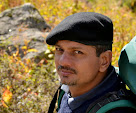Friendly people, unfriendly terrain (Pindari Part-I)
I have mentioned in an earlier post how Rachna, Gautam and I traveled atop a UP roadways bus to reach Haldwani on our way to Pindari. Here is how the journey progressed:
Sleepy and tired, we boarded a bus to Bageshwar from the noisy Haldwani station. That 200 km journey was so slow, so tortuous and so very torturous that it was difficult not to fall asleep. Often, we banged our heads on one another and, when really unlucky, hit the iron handrest in front of us. It was thus a sore trio which got down at Bageshwar. Though we had targetted to reach the last motorable point, Song, on that very day, there was neither rhyme nor rhythm to reach it. Hiring a small room at Bageshwar, we massaged our limbs for the drill ahead and... sloppppppped.
Getting up early the following day and reaching Song, the birth point of our trek, in time was not a problem. Troubles began soon thereto, when, after a few steep paces, Rachs decided her rucksack was TOO loaded. Chivalry becomes thinner during a trek, but since it was just the beginning Gautam and I decided that one person’s sack can be left behind. And her essentials can be distributed between the two of us. We deposited her belongings at the first KMVN lodge at Loharkhet, on the condition that she will share the load whenever either of us felt too pressured (the male ego didn't let such a situation arise, of course).
An ideal trek is considered one where the ascent goes tougher by the day. By this I mean, the first day should be an easier advance, the second can test your strength a bit more and so on; this way, the body becomes conditioned to fatigue and drudgery. But Pindari trek follows a reverse logic: The first day is, arguably, the toughest of all, and thereto the path becomes a plateau — up and down, down and up. The matters on the first day were made worse with our immobile limbs, frozen by city life and cramped by bus journeys. It took some calling to measure the uphill distances and, not surprisingly, we fell well short of our target for day one — Dhakuri. As we threw down our rucksacks on the earth, I saw nobody was willing to hammer the nails or even spread out the tent base. With a heavy heart and heavier knees, your truly went about a predictable exercise with a dome-shape tent, borrowed from Wilson John. Occasionaly when it would be impossible for me to sew up the dwelling only from one end, Rachs would help out and look for gratitude. The tent laid out, I ran errand to trace the nearby water source (had heard the trickle before choosing the spot) and filled the bottles for night. All this while my co-trekkers (damn you Gautam) joked and smoked 'pure' nicotine.
Dinner would have been easier to find had we come a bit later in April, when seasonal dhabas are dotted along the route. Early in the season, most of them were yet to open and since we didn’t have the cooking utensils, the only chocolates, biscuits and rum were on the menue (I hate chocolates, so I devoured a pack of glucose biscuits soaked in, what else, rum).
The next day brought worse trials through an icy rain and cold winds. Many a time, the three of had to squat under one polythene sheet. Waters receded around 9 o’clock and a trickle of smoke up ahead promised hot breakfast. Our legs revived momentum and following a bhotia dog (Tibetan mastiff) we were at the small makeshift dhaba in about 20 minutes. "Dajjyu, teen chai aur 6 ando ka omlette (Brother, three tea and six-egg omlette),” I smiled at him. He had just poured the water for tea when Rachs saw a coffee pouch on display. “Bhaiya chai nahi, coffee bana dena (leave tea, make coffee).” The moment the patient man put milk to boil, I discovered a tetrapack of mango juice in his stock. “Dajjyu, ek coffee cancel, jara yeh mango juice dena (cancel one coffee and pass this mango juice)". Considering that he must have been sick of us fickle-minded by then, I took out a glass of steel from his wares and dug my hand into the rucksack for the rum. Half the glass was filled with dark fluid and the rest with mango juice and, ignoring the disapproving looks from Rachs, I gulped my medicine for the cold and fatigue. Dhakuri was reached a little before lunch time (a good six hours behind the schedule) and we feasted on hot dal-chawal, served Rs 25/- a plate, like hungry Ethiopians (find no racism here). With a few green chilis used to good effect, the food tasted divine. In no time, we were rearing to touch Khati before dusk. And, paddling though it required, we did it in the nick of time for dinner…
(Next post will describe our stay at Dhakuri and trek to Dwali, the confluence point of Pinder and Kafni rivers)
Subscribe to:
Post Comments (Atom)

3 comments:
Loved the part about the dog showing you the way! lol :)
oooooooooooooohhhhhhhh........
sooooooooo cuuuuuuuuute
:P
To arun: Ouccchhhh! now where was that from, huh?
Post a Comment